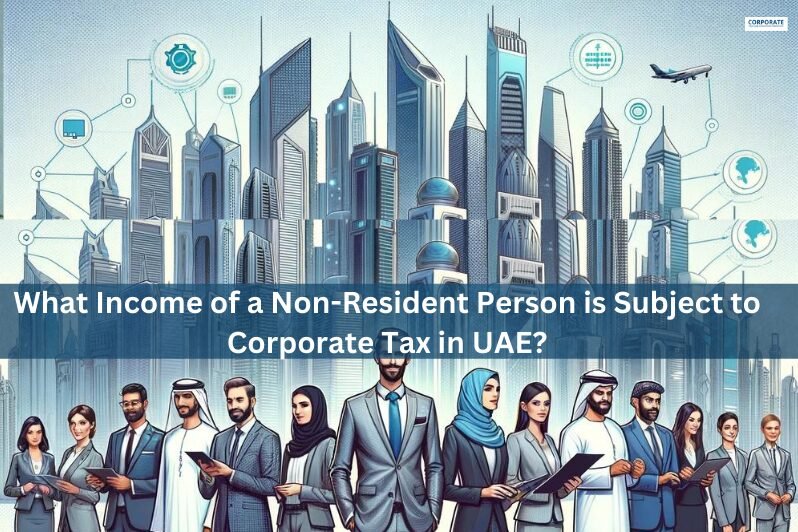The income of non-resident persons is subject to corporate tax in the UAE if it is derived from UAE sources. This includes income from business activities and investments. For personalized advice on tax compliance, consult Corporate Tax UAE. A person who is not resident in the UAE is called a non-resident person. A non-resident person can either be a juridical person or a natural person. Non-resident persons are subject to corporate tax in UAE if they meet certain conditions. The recently published User Guide for non-resident persons enlists all those conditions that cause the income of a non-resident person to be subject to corporate tax. This article explains if the income of a non-resident person is subject to corporate tax registration and payment.
Income of Non-Resident Persons that is Subject to Corporate Tax in UAE
Following is a detailed description of the types of income of a non-resident person (either natural or juridical person) that falls under the scope of paying corporate tax;
-
Income Attributed to a Nexus or Permanent Establishment (PE)
The income of a non-resident person that is attributed to its nexus or permanent establishment in the UAE will be considered as taxable income for the purposes of corporate tax. The corporate tax rate for a non-resident person’s taxable income is as same as that for a resident person, which is;
- 0 percent on the initial taxable income of 375,000 dirhams.
- 9 percent on the taxable income that is exceeding the 375,000 dirhams limit.
The corporate tax rate will be different for a non-resident person if it is a qualifying freezone person, ie.,
- For qualifying income, it will be 0 percent.
- For non-qualifying taxable income, it will be 9 percent.
Moreover, a non-resident person’s income that is attributed to his PE can be earned from either outside or inside the UAE. However, a non-resident person’s income that is attributed to its nexus can be earned from any immovable asset in the UAE.
-
Business Activities or Business that are Taxable
Some business activities of a non-resident person (natural person) can also be subject to corporate tax in UAE if their total turnover (e.g., through a PE) surpasses 1,000,000 dirhams in a year of Gregorian calendar). In addition, the following activities of a natural person don't count as business or business activities and, therefore are not taxable under corporate tax law, nor are they taken into consideration in determining the turnover of a natural person:
- Salaries or wages.
- Returns on personal investments.
- Revenue generated from a real estate investment driven without a license.
-
UAE Sourced Income
Income is deemed State Sourced Earnings if it originates from a Resident Person, a Non-Resident Person, or a Permanent Establishment in the UAE. It can also be generated from activities, property, capital investments, rights, or services carried out in the UAE.
-
UAE Sourced Income and Withholding Tax
Some state-sourced earnings generated by a non-resident person and not attributable to a PE may be liable to withholding taxes. Currently, the rate of withholding tax is zero percent.
-
UAE Sourced Income and PE
UAE sourced earnings and revenue derived from a permanent establishment in the country do not become indistinguishable from one another. The corporation tax is levied on UAE Sourced Income attributed to a Permanent Establishment in the country.
-
UAE Sourced Income and Nexus
UAE sourced earnings and revenue from a nexus in the country are not indistinguishable from one another. UAE Sourced revenue includes revenue from a nexus; hence the corporation tax is levied on UAE Sourced Income combined with a nexus in the emirates.
-
Unavailability of Small Business Relief to a Non-Resident Person
According to the Corporation Tax Law, small business relief is only available for a Resident Person. As a result, non-resident individuals are not able to receive small business support. Nevertheless, this might be influenced by relevant DTAs (Double Taxation Agreements).
-
Exempt Income from operating Ships or Aircraft in International Transportation
Non-resident persons who operate airplanes or ships for global travel are free from paying corporate tax if they engage in the subsequent activities:
- Worldwide transport of passengers, goods, merchandise, parcels, mail, or livestock by sea or by
- Renting or chartering airplanes or ships for global travel.
- Renting machinery necessary for ship or airplane safety.
The exception is only applicable if identical rules are imposed on a Resident Person in the UAE performing similar activities in the region or jurisdiction where the Non-Resident Person resides.
-
Double Taxation Agreement & Corporate Tax Law
Non-resident persons (natural or juridical) that are taxed under the corporation tax legislation can be eligible for relief according to a DTA (Double Taxation Agreement). Non-residents must carefully consider the consequences of a Double Taxation Treaty based on their particular set of circumstances.
In case of contradiction, the UAE's Double Taxation Agreement assumes priority over the corporation tax law and its provisions. Fulfilling the criteria of a Resident Person as per corporate tax legislation cannot guarantee tax residency in the UAE under a Double Taxation Treaty. Under a Double Taxation Agreement, tax residency can be given to either the Arab Emirates or another country, based on the particulars of the situation and treaty text.
Conclusively, all the above nine cases are those that make a non-resident person’s income fall under the scope of paying corporate tax in UAE.
Choose Corporate Tax Advisory Services
To effectively meet corporate tax requirements and ensure compliance, businesses are advised to seek the expert services of reputable Corporate Tax Consultants. Thus, contact us today and we shall be glad to assist you.
